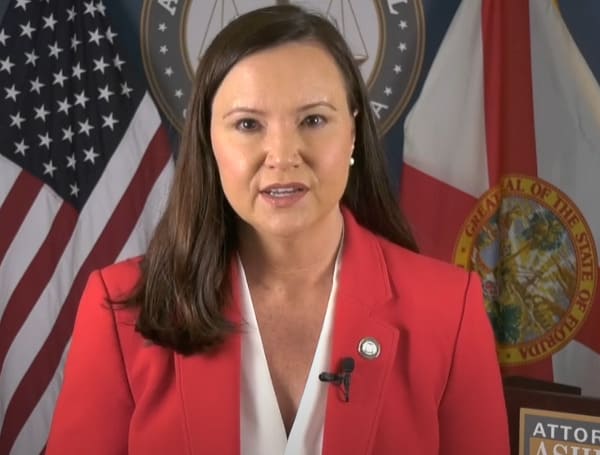Attorney General Ashley Moody late Tuesday urged the Florida Supreme Court to reject a proposed constitutional amendment that seeks to ensure abortion rights, describing the measure as an effort to “hoodwink” voters.
Moody filed a 39-page brief contending that the proposal should be kept off the 2024 ballot because the wording of the ballot summary would be misleading to voters.
The brief said the ballot summary is part of an “overall design to lay ticking time bombs that will enable abortion proponents later to argue that the amendment has a much broader meaning than voters would ever have thought.”
Read: Florida Gov. DeSantis Pushes Back In ‘Executive Privilege’ Fight
Moody signaled last month that she would ask the Supreme Court to block the proposed amendment, which the Floridians Protecting Freedom political committee is trying to pass after Gov. Ron DeSantis and the Legislature approved controversial abortion restrictions. But Moody did not fully detail her arguments until filing the brief Tuesday evening.
The Supreme Court plays a critical role, as it reviews proposed ballot measures to determine if wording is clear and is limited to single subjects. It can reject initiatives that don’t meet legal standards.
The abortion proposal’s ballot summary says, in part: “No law shall prohibit, penalize, delay, or restrict abortion before viability or when necessary to protect the patient’s health, as determined by the patient’s healthcare provider.”
Moody raised a series of objections to the wording, including contending that the word “viability” can have multiple meanings.
Under Roe v. Wade, the landmark U.S. Supreme Court abortion-rights decision that was tossed out last year, fetal viability was generally understood to mean about 23 or 24 weeks into pregnancy. But Moody argued that some voters could interpret viability differently than was understood under Roe v. Wade and another U.S. Supreme Court decision known as Planned Parenthood v. Casey.
“Others will understand ‘viability’ in the more traditional clinical sense — as referring to a pregnancy that, but for an abortion or other misfortune, will result in the child’s live birth,” Moody’s brief said. “This ambiguity is no small interpretive quibble; ‘viability’ in the Roe/Casey sense occurs much later than in the traditional clinical sense. And polling shows that the stage of pregnancy at which abortion becomes illegal is crucial to whether voters approve of particular restrictions on abortion.”
Read: Florida Gov. DeSantis Praises House Republicans Showing “Sound Judgment” On Israel Aid
But after Moody raised the viability issue last month in an opinion piece published on the Florida’s Voice website, Floridians Protecting Freedom disputed her argument.
“The proposed amendment is clear and precise in limiting government interference with abortion ‘before viability,’” Floridians Protecting Freedom Campaign Director Lauren Brenzel said in an Oct. 10 statement. “Viability in the abortion context has always meant the stage of fetal development when the life of a fetus is sustainable outside the womb through standard medical measures. This is how the state of Florida itself defines viability. This is how the United States Supreme Court and Florida Supreme Court still define viability. Dictionaries and doctors also define viability this way in the abortion context. This is a disingenuous argument by a politician desperate to block Floridians from voting on this amendment. Voters know what viability means, and they will see right through this effort to silence their voice.”
Among other issues raised in Tuesday’s brief, Moody said the wording about protecting the “patient’s health” does not explain whether it refers to physical health or also mental health.
“The latter concept of health (mental health), while by no means trivial, is also susceptible to expansive interpretation and could be used to justify a much larger number of abortions,” the brief said. “Here again, voters deserve to be made aware of the possibility that the health exception could be made essentially to swallow the rule.”
In addition, the brief said the ballot summary did not define the term “healthcare provider.” Also, it pointed to the wording that “no law shall” restrict abortions — saying that doesn’t take into account the possibility of federal restrictions.
Groups that oppose the proposal — the National Center for Life and Liberty, Susan B. Anthony Pro-Life America and the Florida Voters Against Extremism political committee — also filed briefs Tuesday at the Supreme Court,
Floridians Protecting Freedom has until Nov. 10 to file a brief. The Supreme Court has not scheduled arguments in the case.
In addition to needing Supreme Court approval, Floridians Protecting Freedom must submit at least 891,523 valid signatures by a Feb. 1 deadline to get on the November 2024 ballot. The state had received 552,630 valid signatures as of Wednesday morning, according to the Florida Division of Elections website.
DeSantis and the Republican-controlled Legislature last year passed a law that prevented abortions after 15 weeks of pregnancy. The Florida Supreme Court is weighing a constitutional challenge to that law.
Lawmakers this year went further by passing a six-week limit. But that limit is contingent on the 15-week law being upheld by the Supreme Court.
Android Users, Click To Download The Free Press App And Never Miss A Story. Follow Us On Facebook and Twitter. Signup for our free newsletter.
We can’t do this without your help; visit our GiveSendGo page and donate any dollar amount; every penny helps
